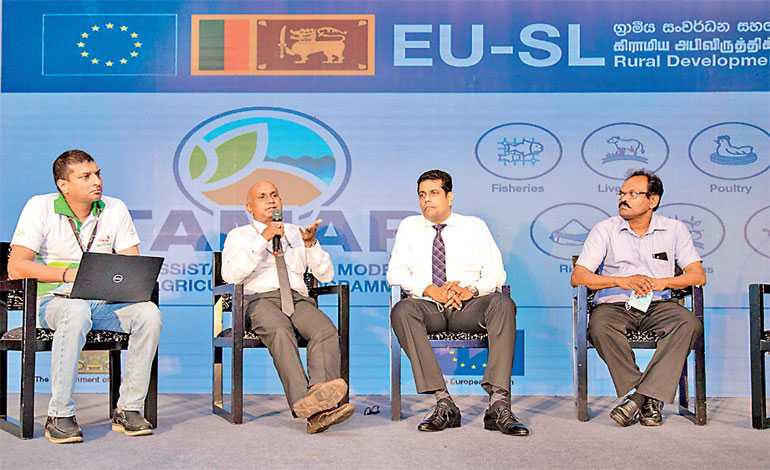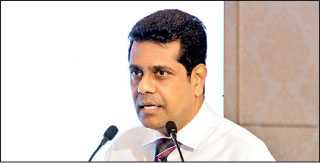Tuesday Feb 17, 2026
Tuesday Feb 17, 2026
Wednesday, 29 July 2020 02:27 - - {{hitsCtrl.values.hits}}

L to R - Charitha Ratwatte, Head of Group Sustainability, Dialog Axiata PLC, Dr. Ajantha de Silva, Additional Secretary, Ministry of Agriculture, Suren Kohombange, Govipola Co-founder and H.M.J.K. Herath of the GIS Unit, HARTI, participating in a panel discussion which took place during the TAMAP workshop on ‘e-Agriculture and Digital Market Platforms’ held recently
 |
| Dr. Nayana Dehigama, Executive Chairman, EPIC Technology Group explains the company’s ‘Helaviru Digital Economic Center platform at the TAMAP workshop on ‘e-Agriculture and Digital Market Platforms’ held recently |
 |
| Charitha Ratwatte, Head of Group Sustainability, Dialog Axiata PLC discusses Govi Mithuru, platform and its contribution to agriculture at the TAMAP workshop on ‘e-Agriculture and Digital Market Platforms’ held recently |
 |
| ‘Govipola’, Suren Kohombange, Co-founder describes the trilingual mobile phone app and web-based programme during the TAMAP workshop on ‘e-Agriculture and Digital Market Platforms’ held recently
|
New online digital technologies are transforming agriculture and are offering new opportunities at every stage of the agri-food value chain.
The COVID-19 crisis accelerated this push. The ‘Technical Assistance to the Modernisation of Agriculture Programme’ (TAMAP) funded by the EU conducted a workshop titled ‘e-Agriculture and Digital Market Platforms’.
The workshop brought together important stakeholders from the e-Agriculture and agriculture sector. The main objective of the workshop was to understand existing systems and digital tools and their ability to achieve more resilient, productive, and sustainable agriculture and food systems, thus empowering farmers’ livelihoods.
Several Digital Market Platform providers showcased their e-Agriculture solutions and innovations supporting the nation and the agribusiness sector.
EPIC Technology Group Executive Chairman Dr. Nayana Dehigama explained the company’s ‘Helaviru Digital Economic Centre’ platform as a “digital ecosystem of agriculture stakeholders, with many apps that act as a digitally connected community of the stakeholders who are engaged in the agriculture sector”.
He elaborated that the stakeholders are farmers, growers, product producers, aggregators, wholesalers, retailers, industries, large-scale buyers, exporters, and service providers, including transport, machinery, banks, logistical companies, consultants etc. All these stakeholders are provided a place on the platform to conduct interactive commercial trading activities.
“We have not eliminated a single actor in the supply chain but empowered every actor to conduct their trading. We want to eliminate unwarranted, unethical practices, influences in the middle that manipulate pricing, practices that create waste that drive up the cost of production, so profitability comes down. We want to ensure dissemination of critical information required by farmers to carry out their trading. We want to promote the application of technology in the farming industry,” he said.
Understanding the problems facing agriculture Dr. Dehigama noted: “Agriculture productivity of this country is still low. We need to support the farmers and the sector as the younger generation is moving away from farming. We want to create a different environment, an image for the younger generation to come forward as agriculture entrepreneurs, give them a different brand.”
The platform provides opportunities for grass-root level facilitators known as ‘Helaviru Leads’ to connect farmers to the platform. The platform also supports spot buying and selling, forward buying and forward selling, bidding and auctioning promoting trading based on market forces, and a dashboard for market price indexes. The Helaviru transport community, operational on the platform known as ‘Riyaviru’, provides transport and delivery options.
Charitha Ratwatte, Head of Group Sustainability, Dialog Axiata PLC, explained the importance of collaborations and partnerships in e-agriculture and their work with numerous stakeholders. Dialog’s ‘Govi Mithuru’ platform is Sri Lanka’s first e-agriculture service contributing towards the country’s agricultural vision and development through technology. The Govi Mithuru platform app service is simple and works on all phones with each user receiving information specifically related to what they are growing and when.”
Currently, Govi Mithuru serves 25 crops with over 600,000 users. The platform has also expanded into other services such as ‘Saru’ which are affordable protected and automated agriculture kits; ‘Saviya’, a mobile based advisory service for dairy farmers; and ‘Sayuru’ a service for day-boat fishermen to receive early warnings, and encourage sustainable fisheries.
In the pipeline, the company is looking into digitising the leaf colour index , code it for every variety, helping farmers check the nutrition status and deficiencies of plants.
“We are working on digitising different aspects of the value chain, working at the major bottlenecks and helping people so that they understand and trust that technology can help them. Our aim is low cost and scalability. It is about risk sharing where we end up with something that is sustainable for all parties.”
Presenting details of ‘Govipola’, Suren Kohombange, co-founder of Govipola said, “Price transparency and access to markets are the basics of Govipola. ” Govipola is recognised as Sri Lanka’s first and largest online agricultural trading platform. The trilingual mobile phone app and web-based programme allows farmers, buyers and sellers to access prices through the app. Kohombange said, “Our aim is also to create a digital index, similar to the stock exchange to show the trend in the market. We intend to build an index showing agriculture market dynamics. We have also introduced alerts to the system, with push notifications.
To-date Govipola has processed 45,000 downloads, has 800 visitors daily, has 600 posts from buyers and sellers, 100,000 metric tonnes listed on the platforms while providing information on 28 types of categories across 286 products.” He added “Moving forward, we want to change it to a more transactional system. As a result of our partnership with the EU, we were guided and assisted in developing a matching engine which we successfully launched early in the year. It is a new journey which we think no one has explored in Sri Lanka.”Kohombange stressed, “We are constantly in touch with user groups, farming communities and academic groups. People will move from a physical environment to a digital environment – we realise we are attractive for people who believe in transition and transformation. Our lesson learnt from the Covid19 crisis is that logistics are a key component and we have integrated logistics solutions in the app.” While private sector stakeholders are important, governments also need to benefit from digital technologies opportunities provided for the agriculture sector.
As the lead agency harnessing ICT for economic and social advancement, Jayantha De Silva, Chairman of the Information and Communication Technology Agency of Sri Lanka (ICTA) stated that , “We are going to revamp our multi-site and started the e-Grama Niladhari project. We own the largest cloud infrastructure network - the Lanka Government Network in Sri Lanka. As government we aim at reaching out to smallholders and all, even the most remote part of Sri Lanka. Government wants to collaborate with the private sector to achieve this.” He advised the present digital providers to “think also about processing - if you come out with plans for processing, your systems will be used more. This environment is not homogenous, and we are very encouraged with what you are doing.”
Expressing his views and elaborating the Government’s role Dr Ajantha De Silva, Additional Secretary, Ministry of Agriculture, said, “There are many players working from the beginning of cultivation until the product arrives at the plate or with the exporter. The country needs the e-agriculture solutions, especially in the situation we have been experiencing in the last few months with the Covid19 pandemic, it is timely and we are ready to support it”. Facilitating the opportunities offered by e-agriculture, he said, “The Agriculture Department has done tremendous work on the technical aspects. As the Ministry we support by providing information and developing a real-time platform open to anybody dealing with agriculture.”
In response to the question whether e-agriculture is the solution, or if there are other solutions available he noted that while e-agriculture is one option, “We cannot leave our traditional ways of doing business, we also have to think about the small vendor and develop solutions for them.”
In conclusion he said, “From the Government side we are very supportive. There should be a level playing field for everyone, and we will assist and support all to advance their activities.”